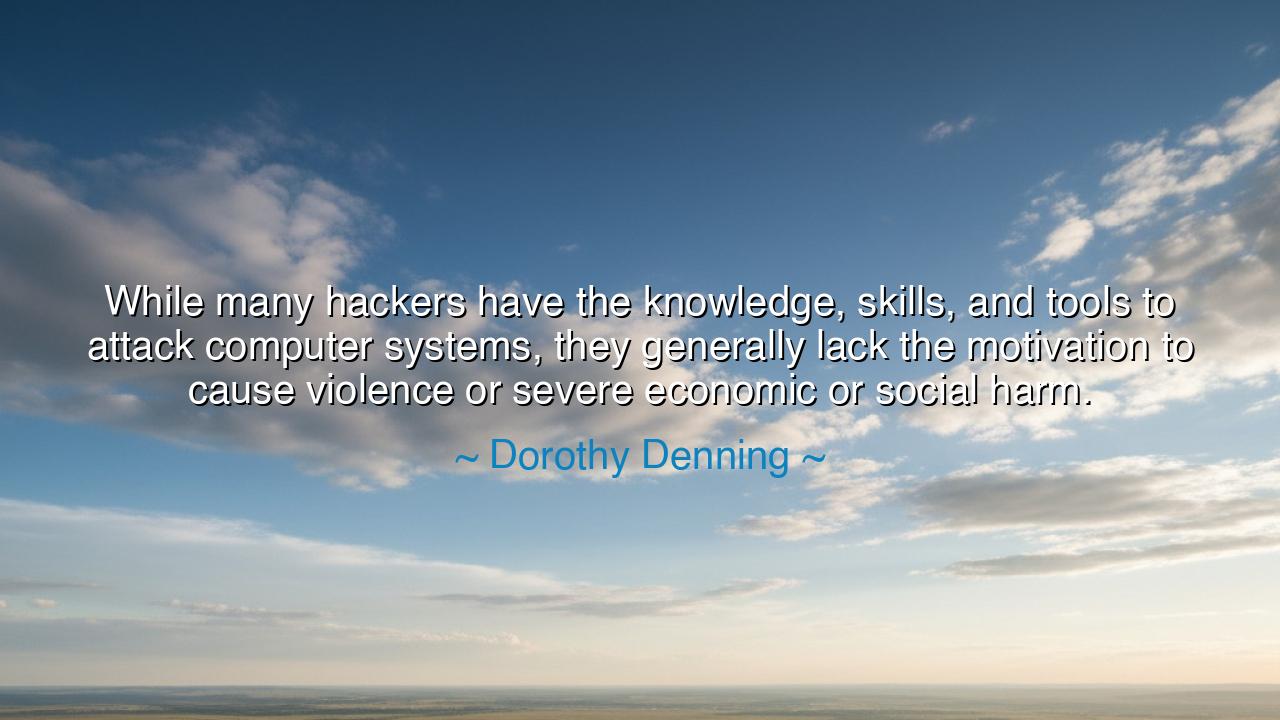
While many hackers have the knowledge, skills, and tools to
While many hackers have the knowledge, skills, and tools to attack computer systems, they generally lack the motivation to cause violence or severe economic or social harm.






“While many hackers have the knowledge, skills, and tools to attack computer systems, they generally lack the motivation to cause violence or severe economic or social harm.”
Thus spoke Dorothy Denning, a pioneer in the field of cybersecurity and a wise observer of the digital age. Her words, though cast in the language of modern science, echo the eternal truth of human nature — that power without purpose is inert, and that knowledge alone does not corrupt, but rather the intent that guides it. She reminds us that those who possess great skill are not necessarily bound to evil; that even in the shadowed world of hackers and unseen networks, there beats within many the heart of curiosity rather than cruelty.
In this saying, Denning distinguishes between capability and intent — between what one can do and what one chooses to do. The hacker, in her vision, is a symbol of the duality of mankind. Like the blacksmith of old who could forge either the plow or the sword, the hacker’s tools — code, logic, and machine — can bring forth both creation and destruction. Yet, as Denning reveals, most do not seek to sow chaos. They are explorers of the digital frontier, seekers of knowledge, drawn by wonder rather than malice. It is not the skill that defines the soul, but the motive that wields it.
To understand her wisdom, we must look to the dawn of the information age, when the world first awakened to the invisible power of the internet. In those days, the hacker emerged much like the alchemists of antiquity — individuals of intellect and curiosity who sought to understand the hidden mechanisms of reality. Some tested the limits of systems not to harm, but to reveal their weaknesses, to strengthen them against the true forces of destruction. These were the ethical hackers, the guardians hidden within the realm of code, who acted not from hatred but from the desire to illuminate the flaws of power before they could be exploited.
Yet Denning’s words carry a warning as well. For though many hackers may lack the will to destroy, the potential for harm remains ever-present. The same knowledge that can protect can also devastate; the same code that defends can deceive. And so, as in all ages, the human spirit stands at the crossroads between creation and corruption. Denning calls us to remember that the moral compass must grow in proportion to our knowledge, lest our gifts become our undoing. It is not enough to be skilled — one must also be wise, and one must choose the path of responsibility.
Consider the tale of Robert Tappan Morris, one of the earliest hackers of the modern age, who in 1988 unleashed what came to be known as the Morris Worm. It spread rapidly, not from hatred or greed, but from miscalculation — curiosity turned careless. The young programmer had sought to understand the network, to measure its vastness, but his creation overwhelmed it instead, paralyzing systems across the United States. His act was not born of malice, yet it revealed how easily innocence in technology can ripple into unintended chaos. From his mistake, the world learned a grave truth: in an age of immense power, even those without evil intent must act with deep foresight and humility.
Denning’s teaching extends beyond hackers and machines; it reaches into the heart of civilization itself. For every age has its inventors, its warriors, its thinkers — those who hold power beyond the understanding of their time. Whether it be the blacksmith with his iron, the chemist with his fire, or the coder with his algorithms, the question remains the same: Will this power serve life or harm it? Wisdom lies not in suppressing skill, but in cultivating conscience. The moral education of the powerful must walk hand in hand with the sharpening of their tools.
Thus, the lesson that flows from Denning’s words is this: knowledge is sacred, but only when guided by purpose and compassion. The one who learns must also learn restraint. The one who builds must also guard what they have built. Empower yourself with understanding, but let your heart be the master of your hand. Seek always to create more than you destroy, to heal more than you harm. For the world will never lack for skill — what it needs are minds of integrity and spirits of wisdom.
So, my child of the digital age, remember this truth: you live in an era where the tools of creation and destruction lie but a keystroke apart. Let your curiosity be fearless, but let your ethics be unshakable. When you wield knowledge, do so as a guardian, not a conqueror. For as Dorothy Denning reminds us, the future does not belong to those who know the most, but to those who know enough to choose rightly.






AAdministratorAdministrator
Welcome, honored guests. Please leave a comment, we will respond soon